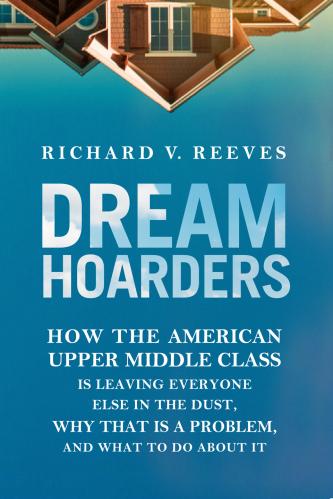In my new book Dream Hoarders, I argue that the American upper middle class is separating from the bottom 80 percent, and that this separation threatens the ideal of equal opportunity.
To be sure, plenty of people have found something in the book to disagree with (for more on that, dig through the comments—if you dare!—on the accompanying op-ed in the New York Times, “Stop Pretending You’re Not Rich” and my appearance on Morning Edition).
But on the other end of the spectrum, others have reach out to ask: “OK, so what should I do, then?”
One answer is to support policies at the national level that will leave you slightly worse off but help to redistribute opportunity. Capping or eliminating tax deductions on mortgage interest or 529 college savings plans, plying extra resources into community colleges, expanding access to family planning, boosting pay for teachers in poor neighborhoods, and so on.
But inequality is also perpetuated in what philosopher Gerry Cohen describes as “the thick of everyday life,” and by the combined effect of millions of individuals acts. We should not subcontract the promotion of fairness to the government. So here are five examples mentioned in the book, as practical steps we could take in our own lives.
We should not subcontract the promotion of fairness to the government.
Be a YIMBY not a NIMBY
Zoning requirements, and in particular ordinances mandating single-family homes, can create upper middle-class cocoons; gated communities in effect, even if the gates are not visible. As Jason Furman, as chairman of the Council of Economic Advisers, put it “zoning regulations and other local barriers to housing development [can] allow a small number of individuals to capture the economic benefits of living in a community, thus limiting diversity and mobility.”
You know who he is talking about, right? You and me. This is not a partisan point. If anything, zoning is more exclusionary in liberal cities.
So: become someone who says Yes In My Backyard, rather than No, a YIMBY not a NIMBY. This doesn’t mean getting rid of all zoning of course, and it doesn’t mean completely altering the look and feel of your neighborhood. Rather than zoning for only single-family dwellings, argue for what the architect Daniel Parolek has labeled the “missing middle” in American cities: townhouses, duplexes, triplexes, two- and three-flats, and bungalow courts. Parolek believes that missing-middle properties should generally be no more than two and half stories high, so as to blend in with detached houses; they would also provide homes for middle-income families in high-cost cities.
Local politicians are rarely pressured by their constituents to move towards more inclusionary zoning policies, for obvious, if self-interested, reasons. Get together with your like-minded anti-Dream Hoarder neighbors and go see your local councillors.
Pressure your alma mater to end legacy preferences
If you went to college, there’s a good chance they call you up and ask you for money. To a new American, this seems downright rude: after all, you did pay them for going in the first place. You might want to direct your charitable giving to a needier institution, such as the nearby community college.
In any case, find out if your alma mater considers legacy status in admissions. If it does, write to the Dean asking them to drop the practice. If you still want to give money to your old college, withhold it until they change the policy. Organize a campaign with fellow alums.
If you don’t, who will?
Lobby your organization for fair internship practices
Does your company or organization hire interns? If so, find out what rules apply when selecting them. If policies against nepotism are not in place, demand to know why not. Insist on an internship recruitment process that is fair and transparent. There should be no special favors to the relatives of funders, or clients, or friends. Why not? You know why. Because it’s unfair opportunity hoarding.
Oh, and don’t use your own personal connections to land an internship for your own children, or the children of friends. If you are asked for help, follow the same rule as for drugs: Just Say No.
Organize a Take Someone Else’s Child to work Day
Take Our Daughters and Sons to Work Day is intended to get children thinking about their future careers, but by having parents take their own kids to work, we perpetuate class divides. If your mother is a lawyer, you spend the day in a law firm. If your dad stocks shelves in a grocery store, then—if he is even allowed to bring you along—that’s what you will see. If your parents are unemployed, you don’t have a chance to go anywhere at all. And so the wheel turns.
Get your organization to turn the whole thing on its head (as Brookings did this year). Strike a blow for equality by taking a kid from a different social background instead. As President Obama said in 2015: “Reach out to young people in your community who don’t have a workplace to visit. Invite them to spend the day with you. Show them what you do every day, and tell them that, with hard work and determination, they can do it too.”
Start planning now: the 2018 day is on April 26th, and marks the 25th anniversary of the Day: a good time for a shift in focus.
Campaign for your PTA to share funds with another school
There are huge inequalities in the money available to schools as a result of PTA fundraising, for obvious reasons. PTAs’ revenues have almost tripled since the mid-1990s, reaching over $425 million in 2010. The bulk of this money being raised by and spent in affluent schools. The nation’s 50 richest PTAs raised and spent $43 million dollars, according to a recent detailed study by Catherine Brown, Scott Sargrad, and Meg Benner at the Center for American Progress. School districts should institute rules to ensure that at least some of this money is shared.
But you don’t have to wait for that. Lobby your own school PTA to give 50 cents for every dollar raised to a school serving low-income kids. Think of this as a form of “social offsetting,” like carbon offsets. By donating to your own school PTA you are likely exacerbating inequality. By sending half of this money to needier kids, you balance things out a little.
“An affair of the conscience”
If these ideas strike you as against your own interests, or the interests of your children, it’s because they are. But unless and until those of us on the prosperous side of America’s economic divide are willing to sacrifice just a little for the greater good, we may as will stop pretending that we are still striving for equal opportunity.
According to the historian Richard Hofstadter, the impulse that fueled the Progressive Era was in large part a self-critical one. “The moral indignation of the age was by no means directed entirely against others,” he wrote in The Age of Reform. “It was in a great and critical measure directed inward. Contemporaries who spoke of the movement as an affair of the conscience were not mistaken.”
Getting closer to the ideal of equal opportunity and a shared American Dream requires a similar period of inward reflection and criticism. Inequality is not just a matter of policy. It is, once again, also an affair of the conscience.
The Brookings Institution is committed to quality, independence, and impact.
We are supported by a diverse array of funders. In line with our values and policies, each Brookings publication represents the sole views of its author(s).








Commentary
Don’t want to be a Dream Hoarder? Here are 5 things you can do right now.
June 23, 2017